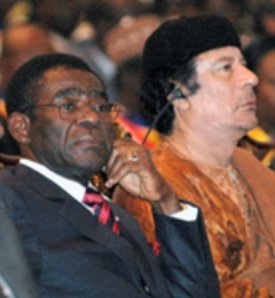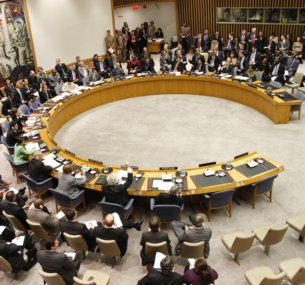|
Africa | Equatorial Guinea | Libya Politics | Society | Human rights Africa defies AU chief's support for Ghaddafi
AU leader and lifetime President Obiang has banned all reporting about the revolutions in North Africa in his own country and has denied authorisation for pro-democracy protests in Equatorial Guinea, planned for 23 March.
There had been much doubt about how African members of the Security Council would vote, especially given the AU resolution opposing a no-fly zone over Libya. This resolution in theory would oblige the three African Security Council members to vote against the resolution. But South Africa's President Jacob Zuma earlier this week indeed made it clear he was favouring the protesters. "Exile, torture, jail or even killing did not succeed to stop the masses of South Africa from demanding their freedom and cannot succeed anywhere else. The recently erupted and massive protests happened because people were tired of autocratic governments which had been there for a long time," President Zuma said. More surprising was the active vote of Gabon to protect Libyan civilians against the Ghaddafi regime. Gabonese President Ali Bongo himself faces a small but persistent protest movement. Gabon however is strongly tied to France, which was the strongest advocate of the UN resolution. The anti-Ghaddafi vote of the Nigerian government, on the other side, did not come as a surprise. Nigerian officials at several occasions have uttered outrage at Colonel Ghaddafi's actions and proposals, at latest when the Libyan leader proposed to split Nigeria in two halves; one Christian south and one Muslim north. But the anti-Ghaddafi mood is widespread in much of Africa, from mostly democratic West Africa, throughout Arab North Africa and to most Southern African countries. Only AU leader Obiang and the AU's Peace and Security Council still stand behind the Libyan leader. President Obiang because he is against popular uprisings in general; the Council because Ghaddafi's Libya is a leader member of it. By staff writer © afrol News - Create an e-mail alert for Africa news - Create an e-mail alert for Equatorial Guinea news - Create an e-mail alert for Libya news - Create an e-mail alert for Politics news - Create an e-mail alert for Society news - Create an e-mail alert for Human rights news
On the Afrol News front page now
|
front page
| news
| countries
| archive
| currencies
| news alerts login
| about afrol News
| contact
| advertise
| español
©
afrol News.
Reproducing or buying afrol News' articles.
You can contact us at mail@afrol.com









